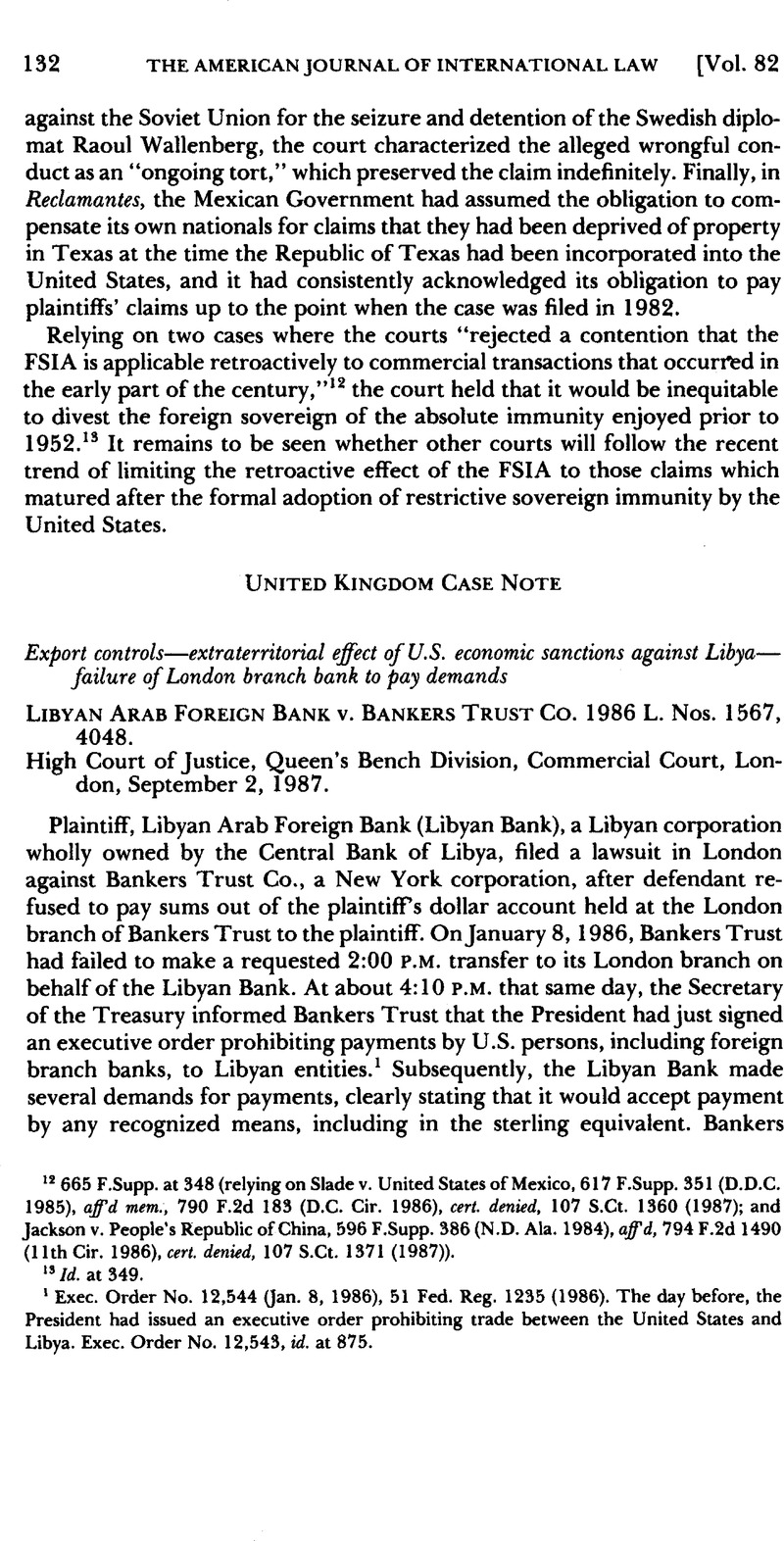No CrossRef data available.
Published online by Cambridge University Press: 27 February 2017

1 Exec. Order No. 12,544 (Jan. 8, 1986), 51 Fed. Reg. 1235 (1986). The day before, the President had issued an executive order prohibiting trade between the United States and Libya. Exec. Order No. 12,543, id. at 875.
2 Six related claims were made altogether. The first two claims are discussed in the text. The third claim concerned the nonexecution of payment instructions on January 8. This claim failed for two reasons. First, the court held that Bankers Trust was entitled to delay executing the instructions because there was no obligation to execute them by a particular time. Second, Libyan Bank had produced no evidence of any loss suffered as a result of the failure to execute the payments. The fourth claim alleged that the information disclosed to the Federal Reserve Bank on January 7 and 8 about the status of the account amounted to a breach of the duty of confidence owed to Libyan Bank. This claim also failed because any such breach of confidence caused the Libyan Bank no loss. Furthermore, the court reached a “tentative conclusion” (a final conclusion was not necessary in view of the finding of no loss) that there may be a public interest exception to the banker’s duty of confidence that applied in this case. The fifth claim alleged frustration of the contract between Libyan Bank and Bankers Trust as an alternative to the first two claims, seeking return of the same sums, i.e., the balance of sums paid in the past to Bankers Trust by Libyan Bank, under the Law Reform (Frustrated Contracts) Act 1943. This claim, would have failed (had it been necessary to decide it) for two reasons. First, Bankers Trust’s obligations had not been frustrated—merely suspended. Second, the Act only directs sums to be returned that were paid “in pursuance of” a contract. There was no obligation on Libyan Bank to deposit sums with Bankers Trust. The sixth claim is discussed in note 3 infra.
3 The operation of the system changed in April 1984. The result of this change was a significant reduction in interest payable to Libyan Bank, which did not become aware of the change until the latter part of 1985. The sixth claim (which was successful) arose from these events but is unrelated to the freeze and is not discussed further here.
4 1986 L. Nos. 1567, 4048, slip op. at 9.
5 Id. at 22.
6 Id. at 23.
7 Id. at 26 (emphasis added). The court concluded that the contractual arrangement was probably governed in part by English law and in part by New York law. Accepting that this was unusual, the court noted that there was authority for severable parts of a contract to be governed by separate proper laws, and also that branches of a bank may be treated as entities separate from their head offices for some purposes. Id.
8 Id. at 19.
9 Id. at 21 (quoting Foster v. Driscoll, [1921] 1 K.B. 470, 521).
10 Id. at 27 (quoting Richardson v. Richardson, 1927 P. 228, 232).
11 Id. at 28.
12 CHIPS and Fedwire are the two U.S. electronic clearing systems. Id. at 40.
13 Under earlier arrangements, the London account had been used as a current account. The court looked at transactions from this earlier period to determine the “course of dealing.” Id. at 40–42.
14 Id. at 46.
15 Id. at 51.
16 Id. at 50. The court accepted the principle but preferred the word “fundamental” to “inalienable.” Id. at 51.